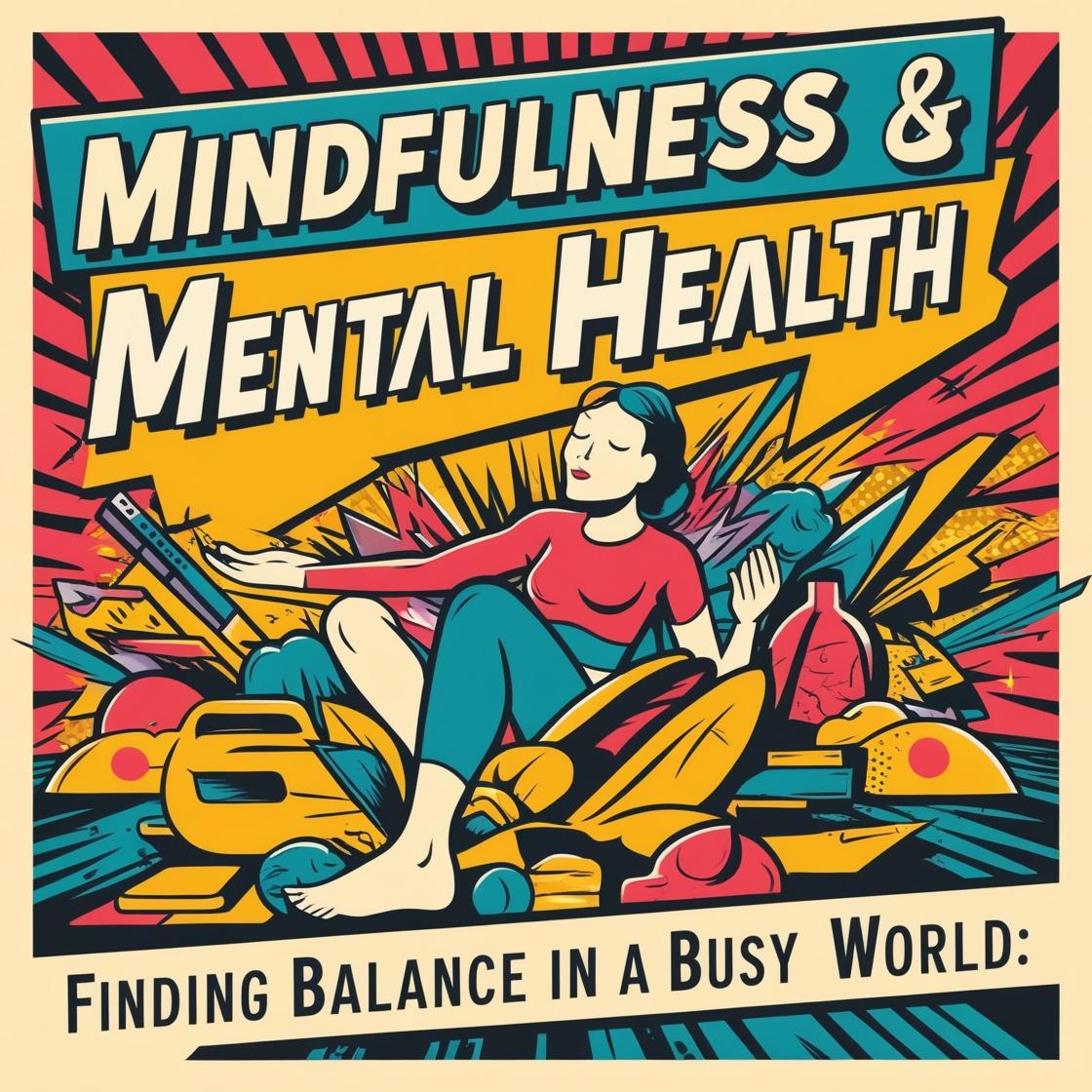Mindfulness & Mental Health: Finding Balance in a Busy World

By Gav on 2025-04-02 09:00:22
Type: mental-health-mindfulness
In today’s fast-paced world, it’s easy to feel overwhelmed, anxious, or disconnected. Our minds are constantly bombarded with notifications, responsibilities, and worries about the past or future. But what if there was a simple, accessible way to feel calmer, more focused, and emotionally balanced? That’s where mindfulness comes in.
Mindfulness isn’t just a trendy buzzword—it’s a powerful tool that can transform mental health by helping us stay present, manage emotions, and reduce stress. Let’s explore how mindfulness works, why it’s beneficial, and how you can incorporate it into your daily routine.
What is Mindfulness?
Mindfulness is the practice of paying attention to the present moment with openness and without judgment. It involves being fully aware of your thoughts, emotions, bodily sensations, and surroundings without getting caught up in them or reacting automatically.
There are many ways to practice mindfulness, including:
-
Mindful Breathing: Focusing on your breath as it flows in and out.
-
Body Scan: Bringing attention to different parts of your body to release tension and increase awareness.
-
Mindful Movement: Practicing activities like yoga, tai chi, or mindful walking.
-
Meditation: Sitting quietly and observing thoughts as they come and go.
-
Mindful Eating: Savoring each bite, paying attention to the texture, taste, and sensation of your food.
How Mindfulness Benefits Mental Health
1. Reduces Stress & Anxiety
Mindfulness helps activate the body’s relaxation response, lowering cortisol (the stress hormone) and reducing heart rate. Research has shown that mindfulness-based interventions can significantly reduce symptoms of anxiety and stress.
By staying present, mindfulness prevents the mind from spiraling into worries about the past or future. Instead of being consumed by anxious thoughts, mindfulness helps you observe them without attachment, making it easier to let them go.
2. Improves Emotional Regulation
Emotions are a natural part of life, but reacting impulsively to them can create problems. Mindfulness allows you to observe emotions without immediately reacting. Instead of getting overwhelmed by anger, sadness, or frustration, you can pause, reflect, and choose a healthier response.
Over time, this practice strengthens emotional resilience, helping you navigate challenges with greater ease and stability.
3. Helps with Depression
Mindfulness is a key component of therapies like Mindfulness-Based Cognitive Therapy (MBCT), which helps individuals with depression recognize and break free from negative thought patterns.
By observing thoughts without judgment, mindfulness helps prevent rumination—the cycle of overthinking negative experiences—which is a common contributor to depression. It creates space between thoughts and emotions, making it easier to shift into a more positive mindset.
4. Enhances Focus & Attention
In a world filled with distractions, staying focused can be difficult. Mindfulness trains the brain to concentrate by strengthening attentional control. Regular mindfulness practice has been linked to improved cognitive function, memory, and the ability to stay present in tasks.
This is especially beneficial for individuals with ADHD or those who struggle with constant distractions, as mindfulness helps build the ability to sustain focus.
5. Promotes Self-Awareness & Self-Compassion
Mindfulness encourages self-awareness by helping you tune into your thoughts, emotions, and behaviors. This awareness allows you to recognize unhelpful patterns and make conscious choices to improve your mental well-being.
Additionally, mindfulness fosters self-compassion—treating yourself with kindness rather than criticism. This is especially valuable for individuals who struggle with self-esteem or negative self-talk.
6. Reduces Negative Thinking
Negative thought patterns—such as catastrophizing, overgeneralization, and all-or-nothing thinking—can contribute to stress, anxiety, and depression. Mindfulness helps you detach from these thoughts by viewing them as passing mental events rather than absolute truths.
By practicing mindfulness, you learn to observe thoughts without getting caught up in them, reducing their emotional power over you.
7. Improves Sleep Quality
Racing thoughts and stress are common causes of poor sleep. Mindfulness helps calm the mind before bed, making it easier to fall asleep and stay asleep.
Techniques like mindful breathing and progressive muscle relaxation can reduce insomnia and promote deeper, more restorative sleep.
Mindfulness Techniques for Mental Health
Incorporating mindfulness into your daily routine doesn’t have to be complicated. Here are some simple practices to get started:
Mindful Breathing
-
Find a quiet place to sit or lie down.
-
Inhale deeply through your nose, hold for a moment, then exhale slowly through your mouth.
-
Focus on the sensation of your breath. If your mind wanders, gently bring it back to your breathing.
-
Practice for 5-10 minutes daily or whenever you feel stressed.
Body Scan Meditation
-
Lie down or sit comfortably.
-
Close your eyes and bring attention to your toes, then slowly move your focus upward to each part of your body.
-
Notice any tension and allow yourself to relax.
-
This practice promotes body awareness and deep relaxation.
Loving-Kindness Meditation (Metta)
-
Sit comfortably and focus on your breath.
-
Silently repeat phrases such as: “May I be happy. May I be healthy. May I live with ease.”
-
Extend these wishes to others—loved ones, acquaintances, and even those you have conflicts with.
-
This meditation fosters compassion and emotional healing.
Mindful Walking
-
Take a walk outside and pay attention to the sensations around you.
-
Notice how your feet feel against the ground, the rhythm of your breath, and the sounds around you.
-
Walking mindfully can be a great way to clear your mind and relieve stress.
Mindful Journaling
-
Spend a few minutes writing down your thoughts and feelings without judgment.
-
The goal is not to analyze but to observe and express what’s on your mind.
-
Journaling can help externalize emotions, reduce mental clutter, and provide clarity.
Mindfulness & Mental Health Disorders
Mindfulness has been shown to help with various mental health conditions, including:
-
Anxiety & Panic Disorders: Helps ground individuals in the present and manage anxious thoughts.
-
Depression: Reduces rumination and enhances emotional awareness.
-
PTSD (Post-Traumatic Stress Disorder): Supports individuals in managing triggers and emotional regulation.
-
Obsessive-Compulsive Disorder (OCD): Helps individuals observe obsessive thoughts without engaging in compulsive behaviors.
Final Thoughts: Embracing Mindfulness for Mental Well-Being
Mindfulness is a powerful, research-backed practice that can transform mental health. Whether you’re dealing with stress, anxiety, depression, or simply looking for ways to improve your well-being, mindfulness offers a practical and accessible solution.
The best part? It doesn’t require special equipment or a huge time commitment. Just a few minutes a day can make a significant difference.






